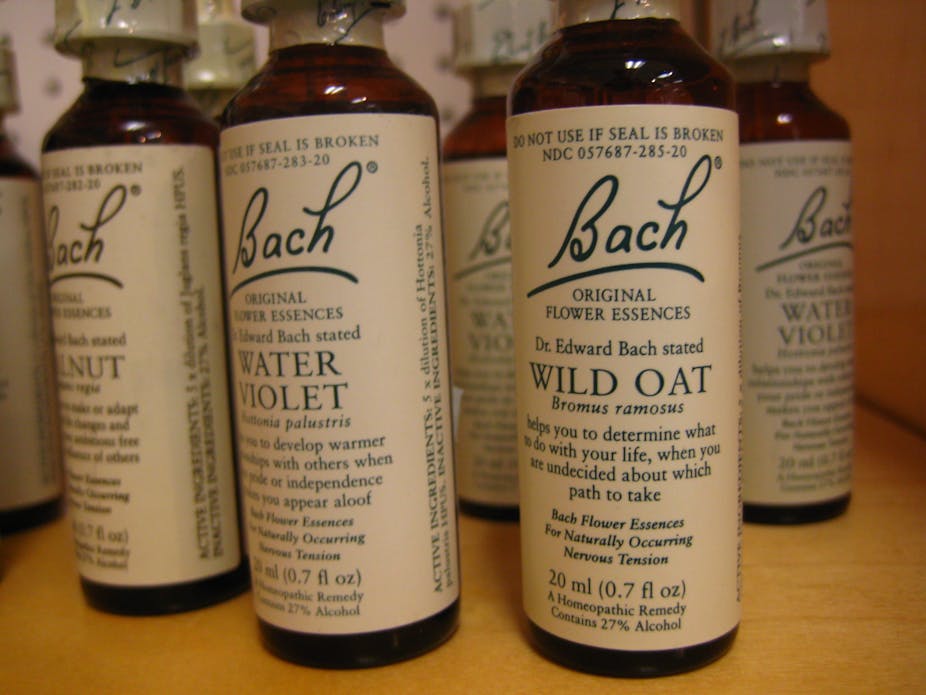The National Health and Medical Research Council (NHMRC) has released its long-awaited review of homeopathy, as well as a tip sheet for doctors to talk to their patient about complementary medicines in general. The review should spell the end of rebates for the practice currently available through some private health insurance companies.
The initial draft for the NHMRC report was leaked back in 2011, but more reviews and consultation had to be undertaken after draft conclusions incensed the complementary medicine community. Unsurprisingly, this exhaustive survey of the evidence for homeopathy concludes that:
there is no reliable evidence that homeopathy is effective for treating health conditions.
First, a quick refresher: homeopathy is a complementary therapy that uses diluted substances for treatment. It’s based on two fundamental concepts – the first is that “like treats like” (for example, using a substance that causes fever to treat a fever) and the second that substances become more potent the more you dilute them.
In some cases, homeopathic medicines are unlikely to contain even a single molecule of starting material. In other cases, materials are too dilute to have any effect at all.
An example of the “like-cures-like” belief is the use of caffeine as a treatment for insomnia because it is used to keep people awake. The homeopathic belief is that extreme dilutions will reverse its stimulant effect to a soporific effect. Needless to say, there is no evidence that this actually occurs.
To say homeopathy is extremely implausible is an understatement. For homeopathy to work, standard physics and chemistry would have to be broken in extremely obvious ways; even making a simple cup of coffee would be impossible.
The review
The NHMRC report is based in a review of available research evidence up to 2013. Reviewers looked at a range of research from case control studies to placebo-controlled, or medication-controlled, clinical trials.
Placebo or medication-controlled clinical trials are the highest level of evidence for the effectiveness of any treatment, and there are several of these trials for various homeopathic remedies. No well-conducted placebo-controlled trial has demonstrated effectiveness of homeopathic remedies.
The review also looked at meta-analyses, where several studies are investigated in aggregate. This has the potential to pick up effects that single studies are not powerful enough to detect. None of these approaches revealed consistent evidence that homeopathy is effective for treating any medical condition
Various homeopathic societies were invited to submit studies for the Australian review. Astonishingly, the majority of the studies submitted by the very people who should have their fingers on the pulse of homeopathic research were irrelevant; they could only identify nine studies not already found by the review panel.
Even these studies were not enough to alter the conclusion that there’s no evidence for homeopathy’s effectiveness.
The report is the latest in a long line of studies that could find no evidence of homeopathy’s efficacy. Tellingly, in the three years since a UK House of Commons Science and Technology Committee report also found homeopathy to be ineffective, there have been no high-quality studies demonstrating the effectiveness of homeopathy.
But then there’s the “Swiss study” – a widely-misrepresented, independent study showing homeopathic remedies are cost effective – that’s often brought up as source of evidence by homeopathy’s defenders.
Undertaken by homeopaths, this was one of two studies commisioned by the Swiss government in a review of whether homeopathy should be covered by its insurance scheme. The study was heavily criticised, and the second one showed homeopathy was ineffective. Insurance coverage of homeopathy was removed.
Practical effects
The NHMRC has also provided an advice sheet to help general practitioners to talk to their patients about complementary medicine in general, as well as about homeopathy. As the great majority of doctors don’t ask their patients about complementary medicine use, most patients don’t tell them about it.
Clearly, increasing this dialogue will be of great benefit, especially for reducing adverse effects from interactions between conventional medicine and complementary medicines.
Although this authoritative report was greatly needed, the impact of the finding on homeopathy in terms of complementary medicine use will probably be minor overall. While around 69% of Australians use some form of complementary medicine at least once a year, only around 6% use homeopathy.
These findings may affect whether homoeopathy will continue to attract health insurance rebates though; you may remember back in 2012 the Labor government looked to remove the insurance rebate for some “alternative” medicines and therapies that had no evidential support.
A report on that review will be ready in April 2015, but is preempted in light of today’s NHMRC report.
It’s time private health insurance companies stopped giving credence to this flawed therapy by providing rebates for it. Surely their customers deserve better.

